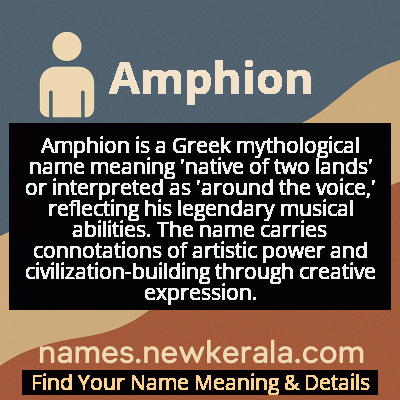Amphion Name Meaning & Details
Origin, Popularity, Numerology Analysis & Name Meaning of Amphion
Discover the origin, meaning, and cultural significance of the name AMPHION. Delve into its historical roots and explore the lasting impact it has had on communities and traditions.
Name
Amphion
Gender
Male
Origin
Greek
Lucky Number
4
Meaning of the Name - Amphion
Amphion is a Greek mythological name meaning 'native of two lands' or interpreted as 'around the voice,' reflecting his legendary musical abilities. The name carries connotations of artistic power and civilization-building through creative expression.
Amphion - Complete Numerology Analysis
Your Numerology Number
Based on Pythagorean Numerology System
Ruling Planet
Uranus (Rahu)
Positive Nature
Strong sense of order, loyal, practical, and disciplined.
Negative Traits
Stubborn, overly serious, rigid, and prone to feeling restricted.
Lucky Colours
Blue, gray.
Lucky Days
Saturday.
Lucky Stones
Blue sapphire.
Harmony Numbers
1, 7, 8.
Best Suited Professions
Managers, engineers, accountants, organizers.
What People Like About You
Dependability, discipline, practicality.
Famous People Named Amphion
Amphion of Thebes
Mythological King
Built the walls of Thebes through magical lyre music
Amphion of Elis
Ancient Athlete
Olympic victor in horse racing
Amphion the Aetolian
Military Commander
Aetolian general during Social War against Macedon
Name Variations & International Equivalents
Click on blue names to explore their detailed meanings. Gray names with will be available soon.
Cultural & Historical Significance
The cultural significance of Amphion extends beyond mythology into the realms of music, architecture, and leadership philosophy. His dual nature as both artist and ruler made him an exemplar of balanced leadership in Greek thought. The contrast with his brother Zethus, who represented physical labor and practical concerns, created a symbolic duality that Greek writers used to explore themes of complementary virtues. Amphion's story was frequently referenced in classical literature, from Homer's Odyssey to the plays of Euripides, ensuring his cultural legacy endured through antiquity and into the Renaissance, where he became a symbol of humanist ideals about the power of education and the arts.
Extended Personality Analysis
Those bearing the name Amphion typically exhibit a remarkable blend of artistic sensitivity and practical leadership abilities. They are natural harmonizers who can bring disparate elements together through persuasion and inspiration rather than force. Like their mythological namesake, they often possess exceptional communication skills and the ability to move people emotionally, making them effective in roles requiring diplomacy, teaching, or creative direction. Their approach to problem-solving tends to be innovative, using creativity to overcome obstacles that might stump more conventional thinkers.
Amphion-named individuals often demonstrate a unique capacity for transformational leadership, able to envision grand projects and inspire others to help bring them to fruition. They typically have strong aesthetic sensibilities and may excel in musical, literary, or visual arts. However, unlike purely artistic temperaments, they maintain a practical orientation, always seeking to apply their creative gifts to tangible achievements. They work well in partnerships, often thriving in collaborative environments where their visionary ideas can be balanced by more grounded colleagues. Their personality combines the dreamer's imagination with the builder's determination, making them particularly suited to careers that bridge creative and practical domains.
Modern Usage & Popularity
In contemporary naming practices, Amphion remains an exceptionally rare choice, primarily confined to families with strong classical interests or Greek heritage. The name sees occasional use in Greece itself, though even there it's considered unusual and traditional. Among English-speaking countries, it appears almost exclusively in academic or artistic families who appreciate its mythological significance and musical connotations. There has been no significant trend toward popularity, with the name maintaining its status as a distinctive, learned choice rather than a mainstream option. Its usage patterns reflect a preference for names with deep cultural resonance over fashionable appeal, making it most common among parents with backgrounds in classics, music, or the arts. The name's rarity ensures it remains distinctive while its mythological background provides substantial meaningful depth for those who choose it.
Symbolic & Spiritual Meanings
Amphion symbolizes the profound concept that art and beauty possess the power to organize chaos and build civilization. The moving stones in his myth represent how creative expression can overcome physical limitations and transform raw materials into structured harmony. This makes the name a powerful metaphor for leadership through inspiration rather than coercion, suggesting that true influence comes from captivating people's hearts and minds. The symbolism extends to represent the marriage of artistic vision with practical achievement, embodying the ideal that the most enduring accomplishments arise from the fusion of creativity and purpose. Amphion also represents the transformative potential of music specifically, serving as an enduring symbol of how artistic discipline can achieve what mere physical effort cannot.

